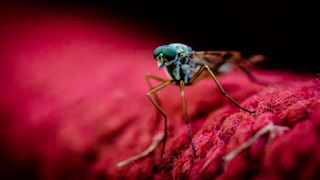A new study shows that the reason some people attract mosquitoes more than others may be due to the type of soap they use.
Using soap suds may seem like a reasonable strategy to ward off mosquitoes on the grounds that if the pesky bugs can't smell you, they won't be able to bite you. However, a recent study suggests that rather than helping you "disguise", fragrances mixed into soap can make you a more attractive target, with mosquitoes preferring the scent of those who washed with three out of four popular soap brands tested.
The scientists who conducted the study said that the mosquitoes may be attracted to the soap because when it is not feeding on blood, it complements the intake of sugar with the plant's nectar.
"It would be like waking up and smelling something that looked like coffee and cake together. Very attractive," said Clement Fenuegger, who led the work at Virginia Tech and the state university.
However, the study also indicated that the effects of soap differ somewhat between people, possibly due to interactions between the soap and each person's scent.
Some studies have already identified chemicals in our body odor that attract mosquitoes that feed on us. But there hasn't been a lot of work done looking at how the scents we add affect attracting mosquitoes.
Finooger explained that mosquitoes use volatile substances emitted from plants to find them and get sugars from their nectar. Therefore, "we suspected that adding these chemicals to our body odor would somehow affect its attractiveness. But this had to be tested experimentally."
He noted that it was remarkable that some of the participants in the study were attractive to mosquitoes when they used a specific brand of soap, and then became repellent to mosquitoes when they used another soap.
The scientists concluded that the choice of soap could partly explain why some people are attractive to mosquitoes while others are not.
The study, which was published in the journal iScience, recruited four volunteers who provided samples of fabric they had worn unwashed or after washing them with four different types of soap: Dial, Dove, Native and Simple Truth. Female mosquitoes (because only females feed on blood) were observed landing on the tissue samples to give an indication of their preference. The tissue was used instead of the volunteers themselves being bitten, to eliminate traces of exhaled carbon dioxide, another important indicator of mosquitoes.
Washing with the Dove, Dial and Simple Truth soap brands increased mosquito attraction to some, but not all, while washing with Native soap tended to repel mosquitoes.
The scientists said the relatively repellent effect of Native soap could be related to the smell of coconut, as there is some evidence that coconut oils are a natural mosquito deterrent.
Scientists use an RNA vaccine to suppress pancreatic cancer : Journal Nature
This type of cancer is diagnosed in approximately 460,000 people each year.
US doctors used an RNA vaccine for the first time to suppress one of the most aggressive types of pancreatic cancer, and published the results of their study in the journal Nature.
The study stated: “Our experiments showed that our single RNA vaccine based on pancreatic cancer antigens led to the production of large quantities of tumor-attacking T cells in 50% of patients with severe forms of this malignancy. These cells continued to survive within patients' body for at least two years even after repeated chemotherapy.
According to American researchers, pancreatic cancer remains one of the most common and fatal types of malignant tumors in the world. It is diagnosed annually in about 460,000 patients, while primary tumors, metastases, and complications associated with the development of this form of tumors claim the lives of about 432,000 patients annually. On average, only 9% of patients survive 5 years after the discovery of a malignant tumor.
In order to develop this gene therapy, scientists took samples of cancer cells from each patient's body, studied their characteristics and selected twenty antigens that these cancer bodies produce most often. The instructions for the synthesis of these molecules are encoded in RNA strands, causing patients' cells to produce a large number of copies of the antigens. These molecules caught the attention of the immune system and made it produce T cells and antibodies that attack the tumor.
Studies have shown that the vaccine had a successful effect on half of the volunteers and forced their immune system to actively fight cancer cells. As a result, they were able to survive for more than 30 months after the operation without metastasis, while all volunteers from the control group developed secondary tumors in the following 13-18 months. The results of such tests, according to scientists, testify to the high efficacy of the RNA vaccine they have developed against cancer.
Over the past few years, scientists have created many prototypes for vaccines and gene therapies based on parts of what is called messenger RNA. They cause human cells to produce specific proteins and other molecules that stimulate the development of immunity against certain viruses, help destroy cancer cells or suppress disease-causing processes in various organs of the human body.
Tags:
health



